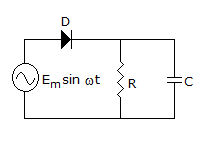Question

a.
Em
b.
2 Em
c.
0.5 Em
d.
√2 Em
Posted under Electronics and Communication Engineering
Interact with the Community - Share Your Thoughts
Uncertain About the Answer? Seek Clarification Here.
Understand the Explanation? Include it Here.
Q. In the circuit of figure, PIV can be up to
Similar Questions
Explore Relevant Multiple Choice Questions (MCQs)
Q. In the circuit of figure β = 50 and VBE = 0.5 V. The quiescent value of base current IB is
View solution
Q. In figure the input and output Miller capacitances are
View solution
Q. Figure uses 10 V zener diode. The minimum and maximum current through series resistance are
View solution
Q. When Z1 << Z, The circuit of figure works as
View solution
Q. Voltage VL in the circuit when Vs < 0 where D is an ideal diode. (Take R1 = Rs = RL = 1 Ω)
View solution
Q. For the amplifier in figure, β = 800. The mid-band voltage gain V0/Vi is
View solution
Q. In the circuit of figure, v0 =
View solution
Q. The bandwidth of an amplifier is BW, of n-stage of such as amplifier are cascaded, the bandwidth will become
View solution
Q. The voltage eo indicated in the figure has been measured by an ideal voltmeter. Which of the following can be calculated?
View solution
Q. The circuit of figure is
View solution
Q. In figure gain bandwidth product is
View solution
Q. Which of the following figures is an ideal equivalent circuit of a n-p-n transistor?
View solution
Q. In the circuit of figure, the value of re is (neglecting vbe)
View solution
Q. In figure Vi may vary from 15 to 20 V and load current may vary from 20 mA to 100 mA. Suitable maximum value of R is
View solution
Q. In the circuit shown in the given figure, the current flowing through resistance of 100 Ω would be
View solution
Q. In figure the dc load line will meet the y and x axis respectively at
View solution
Q. In a CE class A amplifier the quiescent current and voltage are ICQ and VCEQ. The maximum power output can be
View solution
Q. The ripple factor of a power supply is
View solution
Q. If the op-amp in figure has a unity gain frequency of 1 MHz, the cut off frequency is
View solution
Q. In figure, IC ≈
View solution
Recommended Subjects
Are you eager to expand your knowledge beyond Electronics and Communication Engineering? We've handpicked a range of related categories that you might find intriguing.
Click on the categories below to discover a wealth of MCQs and enrich your understanding of various subjects. Happy exploring!








